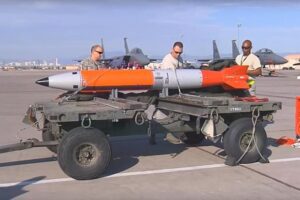The Department of Defense recently announced that the United States will pursue a modern variant of the B61 nuclear gravity bomb, designated the B61-13, pending Congressional authorization and appropriation.
The Department of Energy’s National Nuclear Security Administration (NNSA) would produce the B61-13. The decision to pursue this capability, which was undertaken in close collaboration with the NNSA, responds to the demands of a rapidly evolving security environment as described in the 2022 Nuclear Posture Review.
“Today’s announcement is reflective of a changing security environment and growing threats from potential adversaries,” said Assistant Secretary of Defense for Space Policy John Plumb. “The United States has a responsibility to continue to assess and field the capabilities we need to credibly deter and, if necessary, respond to strategic attacks, and assure our allies.”
 The B61-13 would be deliverable by modern aircraft, strengthening deterrence of adversaries and assurance of allies and partners by providing the President with additional options against certain harder and large-area military targets. It would replace some of the B61-7s in the current nuclear stockpile and have a yield similar to the B61-7, which is higher than that of the B61-12.
The B61-13 would be deliverable by modern aircraft, strengthening deterrence of adversaries and assurance of allies and partners by providing the President with additional options against certain harder and large-area military targets. It would replace some of the B61-7s in the current nuclear stockpile and have a yield similar to the B61-7, which is higher than that of the B61-12.
“The B61-13 represents a reasonable step to manage the challenges of a highly dynamic security environment,” said Plumb. “While it provides us with additional flexibility, production of the B61-13 will not increase the overall number of weapons in our nuclear stockpile.”
The B61-13 would take advantage of the current, established production capabilities supporting the B61-12, and would include the modern safety, security, and accuracy features of the B61-12.
This initiative follows several months of review and consideration. The fielding of the B61-13 is not in response to any specific current event; it reflects an ongoing assessment of a changing security environment.
(photo from U.S. Air Force video by SSgt. Cody Griffith)


